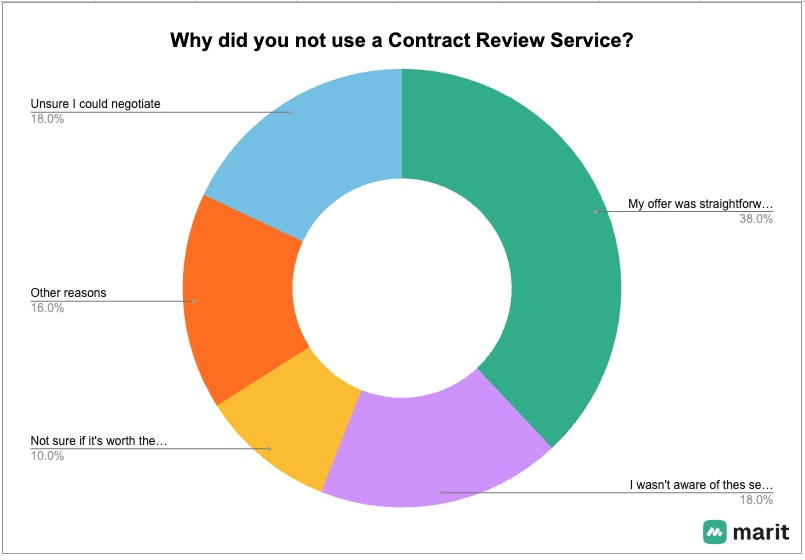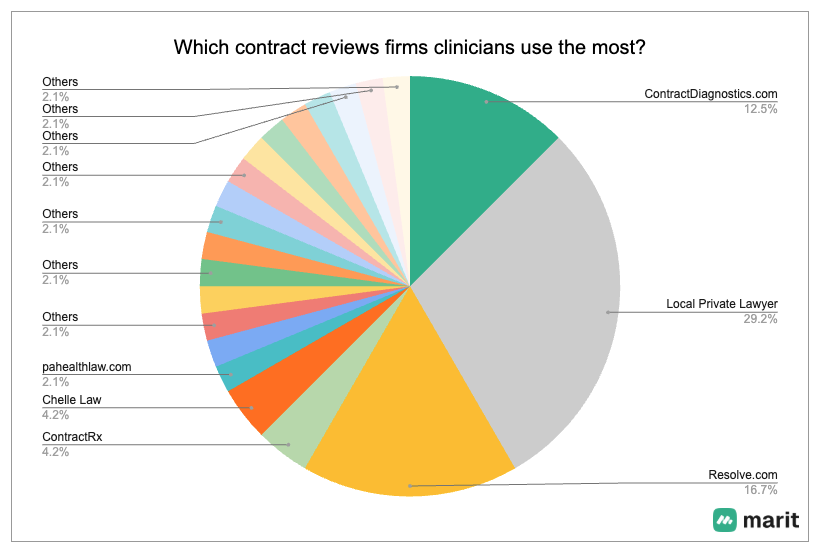We often get asked by our community whether they should use a contract review service and if there is a firm we’d recommend. Being as a community powered solution, we decided to turn to the people who know this best, i.e. our community, to share their own experiences. The survey results below offer powerful insight into how your peers are navigating employment contracts. In this post, we’ll break down the top takeaways and share tips for your own contract reviews and negotiations.
How often do clinicians use a contract review service?
Despite the high stakes of these agreements, only 29% of respondents used a contract review service when negotiating their deal. This means that most clinicians are probably missing an opportunity to maximize their earnings (and avoid costly surprises), which is particularly risky given that an employment contract can easily be worth hundreds of thousands of dollars. A good lawyer or contract review specialist can catch pitfalls and ensure you’re not leaving money (or rights) on the table. In fact, more than half of new clinicians leave their first job within a few years, and if you don’t understand the nuances of your contract, leaving early could mean having to pay back hefty bonuses, covering your own tail coverage, or dealing with non-compete clauses.
Despite the high stakes of these agreements, only 29% of respondents used a contract review service
Why do clinicians skip contract review services?
We asked those who did not use a review service to describe why they chose not to. Here is the breakdown -

- “My offer was straightforward, so I didn’t need one.” This was the most common reason, cited by roughly 38% of those who skipped a review. Many felt their contract was standard or straightforward enough that they could handle it themselves.
- “I didn’t think I had room to negotiate.” About 18% assumed that the offer was fixed and there was no point in trying to negotiate or get it reviewed.
- “I didn’t know these services existed.” Another 18% shared they weren’t even aware that physician contract review services are a thing!
- “It wasn’t worth the money.” ~10% felt that paying for a review wasn’t justified for their situation.
- Other reasons (the remaining ~16%) included having a friend or mentor review the contract, or simply not having enough time to obtain a professional review before signing.
Don’t let terminology like “standard agreement” trick you into believing there’s no room for negotiation. Just because the first draft is labeled “standard” doesn’t mean you can’t request modifications. Even large hospital systems that won’t overhaul their benefits package might offer other concessions (e.g., a signing bonus, extra CME funds, a more favorable schedule) when pressed. In short, there is almost always something negotiable in your contract.
Additionally, believing there’s no room to negotiate is often not true. In his 40 years of reviewing deals, Dennis Hursh says he can count on two hands the number of times an employer refused to change anything; the vast majority of employers will make reasonable changes if asked.
As the White Coat Investor blog bluntly put it, don’t be penny-wise and pound-foolish by avoiding a few hundred dollars for advice on a contract that governs hundreds of thousands of your income. A physician contract is a pivotal document in your financial and professional life; investing in a thorough review is usually well worth it.
For the 1 in 5 clinicians who said they weren’t aware of contract review services, this next section is for you!
Who do clinicians turn to for contract review?
Interestingly, the 29% of respondents who used a contract review service named 33 different providers between them – a sign that the physician contract review market is highly fragmented. Here were the top 3 most popular choices:

- Local or Private Lawyer: The most common route (approximately 29% of those who used a service) was hiring a local attorney, often on a one-on-one basis. Many physicians seem to trust a lawyer they know or someone recommended to them personally.
- Resolve: Around 17% used Resolve, a well-known physician contract review company.
- Contract Diagnostics: Approximately 13% opted for Contract Diagnostics, a nationwide physician contract review firm. Their expert team has helped tens of thousands of clinicians maximize the benefits of their employment contracts, which is why we’re proud to partner with them to provide contract reviews. PS: Marit has a partnership with Contract Diagnostics, so if you happen to use them through us, you'll get a 10% discount (use code MARIT10) and we will get a small referral free. Use this link
- The remaining ~40% were spread across dozens of other firms or consultants. These ranged from niche specialists (e.g., firms catering to a specific region or specialty) to other national services and consultancies.
There’s no one-size-fits-all approach here – some clinicians prefer working with local attorneys who understand the nuances of their state laws, market dynamics, and specialty. Others opt for larger national firms with deep experience reviewing physician and APP contracts across all employment types and locations. The key is finding someone with expertise in clinician contracts who can help you navigate employment law nuances, restrictive clauses, RVU structures, MGMA benchmarks, etc.
How much do contract review services cost?
The typical price range falls anywhere from $200 to $1,500, with a median cost of $800. Many survey respondents paid a few hundred dollars (common price points were $500, $600, or $750), while others paid around $1,000 for comprehensive review packages.
The typical price range falls anywhere from $200 to $1,500, with a median cost of $800.
On the higher end of the spectrum, some paid $1,500+ for premium services or lawyers – these might include more in-depth negotiation help or multiple rounds of review. A few mentioned packages like $1,800 for two contracts, or $3,000 for contract review plus negotiation assistance. In one outlier example, a group practice pooled together $30,000 to pay for a contract review for the entire group!
What were clinicians able to negotiate?
One major benefit of using a contract review service (or just being a savvy negotiator yourself) is finding out what parts of your contract are negotiable. Based on our survey, the contract terms that clinicians successfully negotiated most frequently were:

Signing Bonuses & Relocation (Signing Benefits):
The number one negotiable item was signing bonuses or loan forgiveness/relocation packages, successfully negotiated by roughly 43% of respondents. If an employer can’t budge on salary, they might have more flexibility to offer a one-time bonus or cover moving expenses.
Compensation (Salary/RVUs):
Next was core compensation (base salary and/or productivity metrics like $ per wRVU), negotiated by about 41% of respondents. This is no surprise—salary is usually top of mind. Many reported getting salary increases or adjustments as a result of negotiations. This is obviously the power of the clinician salary data on Marit as well
Separation Clauses (Restrictive Covenants):
About 40% of respondents negotiated separation clauses, including things like non-compete agreements, non-solicitation clauses, and termination provisions. Physicians frequently push back on overly restrictive covenants—for good reason, as these can significantly impact your future opportunities. Some were able to shorten the duration or radius of non-competes, or clarify termination notice periods, etc.
Malpractice Insurance & Tail Coverage:
Approximately 27% of respondents negotiated their malpractice coverage, with many ensuring the employer covers tail insurance if they leave. This is a critical area to clarify; a contract review often flags if you’d be on the hook for expensive tail coverage, and many were able to negotiate better terms here.
Work Structure (Schedule, Call Duties):
Around 21% negotiated aspects of their work schedule or structure - for example, the number of shifts per month, on-call frequency and pay, moonlighting rights, etc. These quality-of-life terms are absolutely negotiable, and several respondents managed to tweak them to their favor (like reducing call frequency or getting specific hours expectations in writing).
Compensation Clawbacks:
About 13% negotiated clawback provisions. These are the conditions under which you’d have to pay back compensation, such as a signing bonus repayment if you leave early. Negotiating a shorter commitment period for bonuses or removing onerous clawbacks was a win for some.
Standard Benefits (CME, PTO, Insurance):
Only a small number (around 6%) were able to negotiate standard benefits like CME allowances, paid time off, or health insurance details. This aligns with expectations: large employers often have standardized benefits that they rarely adjust for individuals. However, as noted earlier, you may still be able to negotiate on one-time perks (e.g., higher sign-on bonus) even if the benefits can’t change.
It’s worth noting that ~17% of respondents said they weren’t able to negotiate anything in their contract, or that they “didn’t try to negotiate, just wanted a review for red flags.” In some cases (particularly academia or certain large HMOs), you truly might have a take-it-or-leave-it offer. However, as our expert insight reveals, outright non-negotiable contracts are rare. If you’re unsure what’s fair game to negotiate, that’s where a service like Contract Diagnostics or an experienced lawyer can guide you – they’ll tell you which terms are easier or harder to negotiate for your circumstances.
And most importantly, do contract reviews really pay off?
The answers were quite eye-opening. They ranged from $0 (no change) to as high as $100,000(!) in extra compensation or benefits. Here’s a summary:
The average payoff was approximately $15,973. The median payoff was $10,000

- No Financial Gain: First, not everyone got a raise from negotiating – in fact, roughly half of respondents reported $0 in additional pay. Some explicitly said “No changes” or “No value increase” resulted. This could be because their employer truly wouldn’t budge, or because the contract was already at a good market rate. However, even in these cases, many still found value in conducting the review (for peace of mind or to clarify terms, such as not having to repay a bonus if fired without cause, etc.). As one person noted, “The review confirmed that the contract I was being offered was very generous for my specialty… already at a high percentile of MGMA.” Knowing that can itself be worth the cost of review, so you don’t second-guess later.
- Modest Improvements: Several respondents gained an additional few thousand dollars. For example, some received an additional $5,000 in covered moving expenses, or $2 more per hour (which adds up over a year). A common theme was requesting and receiving a slightly higher signing bonus. One said, “$5K from signing, $30K retention bonus added, and also time to disbursement” – effectively turning a standard offer into an extra $35K contingent on staying a specific period. Another got one less year on a vesting period for their bonus (which is a win by itself).
- Significant Raises: Many reported $10K to 30K increases in their compensation. We saw multiple instances of “$10K increase” in salary or bonus. Some combined improvements: “$25,000 salary increase and $10,000 additional relocation” – a huge $35K total gain. Others got about $15K added to signing bonuses or base salary. These are not trivial sums – particularly for an early career clinician, an extra $10K in salary, compounded over years or invested, can be substantial.
- Big Wins: A handful reported $40K+ in value gained. One mentioned a $45,000 improvement. Perhaps most strikingly, one physician managed to get a $75,000 reduction in a non-compete buyout amount – meaning if they ever left, they’d owe $75K less to get out of the non-compete. That’s a huge potential future savings. And one respondent estimated the changes in their contract could be worth $100,000 over time (possibly due to a much better productivity formula or improved partnership track).
- Qualitative Benefits: Beyond raw dollars, many gains were about quality of life and risk mitigation. Examples: securing tail malpractice coverage paid by employer (which might save you tens of thousands if you leave), getting increased vacation time, or converting a confusing compensation model into a clearer one (e.g., switching from a low base salary to 70% of collections – for someone in a high-earning practice, that could greatly increase earnings). One person said the review caught a missing RVU bonus clause that the employer then added – ensuring they’d be paid what they deserved. Another mentioned the review helped negotiate that they wouldn’t have to pay back their sign-on bonus if terminated without cause. These kinds of contract tweaks might not put cash in your pocket immediately, but they protect you from costly surprises and set you up for a more sustainable career.
It’s clear that outcomes vary, but many physicians do see tangible financial benefits from contract reviews and negotiations. Even those who didn’t get more money often gained clarity and avoided unnecessary risks. Considering that most reviews cost less than $1,000, the return on investment is favorable on average – one could argue it’s one of the best investments you can make when starting a new job.
Final thoughts from the community
At the end of our survey, we invited respondents to leave any comments or reviews of the contract review services they used. The responses were candid and insightful.
Overall Satisfaction: The average rating for overall experience with contract review services was 4.23 out of 5, which indicates generally positive experiences. Many commented that they would use a professional review again for their next contract. One user wrote that their reviewer “was very thorough in going through everything,” and another said the process provided “peace of mind.” It seems most felt the review was worth it, even if just for confidence in what they were signing.
The average rating for overall experience with contract review services was 4.23 out of 5
Advice to Peers: Perhaps the single most consistent piece of advice from our respondents was this: advocate for yourself. As one physician noted: “Always negotiate when able; the worst they can say is ‘no.’” Even if you’re unsure whether there’s room to negotiate or how to go about negotiating, we strongly encourage you to seek out guidance (from a mentor, contract review specialist, or even a peer) and give it a shot.
As one physician noted: “Always negotiate when able; the worst they can say is ‘no.’”
Conclusion: Lean on your community and the experts
Medicine can be quite lonely, but it does not have to be. If we can all share experiences with each other, we can advocate for ourselves. By seeing how others approached their contracts – what they negotiated, which services they used, what it cost, and what they got – you can make more informed decisions about your next contract. This is the power of your community here on Marit: helping one another make better choices in their careers.
Thank you to everyone who participated in the survey! We hope these insights help you in your next job negotiation or contract renewal. And if you had your contract reviewed in the last 2 years, tell us about your experience by completing the 1-minute survey and help your peers navigate their next contract.


